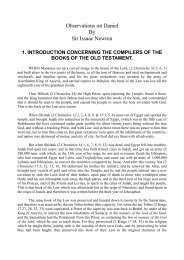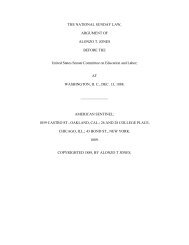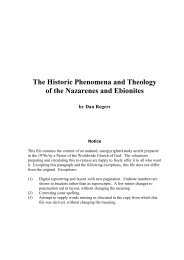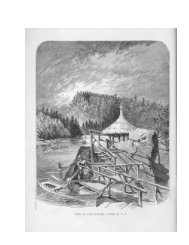by Percy E. Corbett - friendsofsabbath.org
by Percy E. Corbett - friendsofsabbath.org
by Percy E. Corbett - friendsofsabbath.org
Create successful ePaper yourself
Turn your PDF publications into a flip-book with our unique Google optimized e-Paper software.
17<br />
certainly, the greater part perhaps, was spent in Britain, in Siluria or Cambria, beyond the<br />
bounds of the Roman Empire; and hence the silence of the Greek and Latin writers upon it.<br />
The "Long Lost Chapter of the Acts of the Apostles." (The Sonnini MS) records that St. Paul<br />
preached from the summit of Ludgate Hill, London and that St. Paul's Cathedral was erected<br />
on the site.<br />
Capellus, in "History of the Apostles," writes:-<br />
"I know scarcely of one author from the time of the Fathers downward who does not maintain<br />
that St. Paul, after his liberation, preached in every country of the West, in Europe, Britain<br />
included."<br />
Jowett claims that definite references to St. Paul's visit to Britain are made <strong>by</strong> Irenaeus, A.D.<br />
125-189, Terullian, A.D. 122-166; Origen, A.D. 185-254; Mello, A.D. 256; Eusebius,. A.D. 353;<br />
Ventanius, Bishop of Jerusalem sixth century, and other writers of the Roman, Eastern, Gallic<br />
and Spanish Churches.<br />
In the Vatican Museum there is an unusual relic in the form of a glass medallion depicting a<br />
contemporary portrait of the heads of Linus and Paul.<br />
Jowett states that the term 'Extremity of the West' refers to Britain, and records St. Clement as<br />
writing:-<br />
"St. Paul, having seven times worn chains and being hunted and stoned, received the prize of<br />
such endurance. For he was the herald of the Gospel in the West as well as in the East, and<br />
enjoyed the illustrious reputation of the faith in teaching the whole world to be righteous. And<br />
after he had been in the extremity of the West, he suffered martyrdom before the sovereigns of<br />
mankind; and thus delivered from this world, he went to his holy place, the most brilliant<br />
example of steadfastness that we possess."<br />
In Merton College, Oxford there is an ancient MSS which purports to contain a series of letters<br />
between St. Paul and Seneca. In them are several allusions to St. Paul's residence in Siluria. It<br />
is known as the Paulian M.S.<br />
It is claimed that St. Paul landed at what is now a suburb of Portsmouth, known over the ages<br />
and at present time as 'Paul's Grove.' From there, he made his way into Cambria where he<br />
founded the Abbey of Bangor. The doctrine and administration of the Abbey was known as<br />
Pauli Regula - "The Rule of Paul." All the Abbotts that followed considered themselves as the<br />
direct successors of Paul. It later developed as a monastery and its membership is stated <strong>by</strong><br />
Bede to have risen to two thousand one hundred.<br />
His rules for living a Godly Christian life are recorded in the "ancient British Triads" as "The<br />
Triads of Paul the Apostle."<br />
The following report was published in the 'Morning Post' on 27th March, 1931:- "The Mayors of<br />
Bath, Colchester and Dorchester and the 150 visiting members of the Friends of Italy Society<br />
were today (26.3.1931) received <strong>by</strong> the Pope. His Holiness, in a specially prepared address,<br />
advanced the theory that it was St. Paul himself and not Pope Gregory who first introduced<br />
Christianity into Great Britain."

















